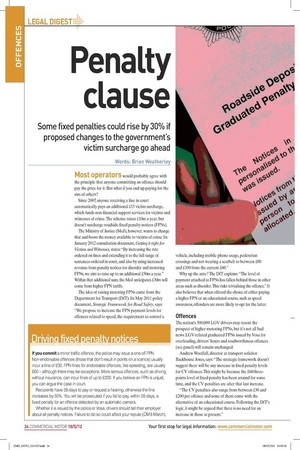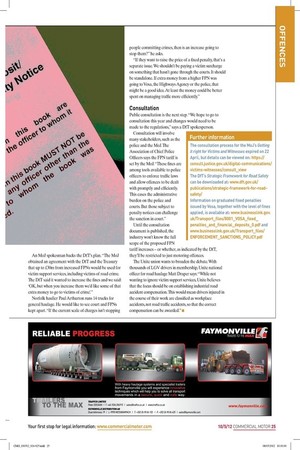Penalty clause
Page 18

Page 19

If you've noticed an error in this article please click here to report it so we can fix it.
Some fixed penalties could rise by 30% if proposed changes to the government’s victim surcharge go ahead
Words: Brian Weatherley
Most operators would probably agree with the principle that anyone committing an offence should pay the price for it. But what if you end up paying for the sins of others?
Since 2007, anyone receiving a fine in court automatically pays an additional £15 victim surcharge, which funds non-financial support services for victims and witnesses of crime. The scheme raises £10m a year, but doesn’t surcharge roadside fixed penalty notices (FPNs).
The Ministry of Justice (MoJ), however, wants to change that and boost the money available to victims of crime. Its January 2012 consultation document, Getting it right for Victims and Witnesses, states: “By increasing the rate ordered on fines and extending it to the full range of sentences ordered in court, and also by using increased revenue from penalty notices for disorder and motoring FPNs, we aim to raise up to an additional £50m a year.” Within that additional sum, the MoJ anticipates £30m will come from higher FPN tariffs.
The idea of raising motoring FPNs came from the Department for Transport (DfT). Its May 2011 policy document, Strategic Framework for Road Safety, says: “We propose to increase the FPN payment levels for offences related to speed, the requirement to control a vehicle, including mobile phone usage, pedestrian crossings and not wearing a seatbelt to between £80 and £100 from the current £60.” Why up the ante? The DfT explains: “The level of payment attached to FPNs has fallen behind those in other areas such as disorder. This risks trivialising the offence.” It also believes that when offered the choice of either paying a higher FPN or an educational course, such as speed awareness, offenders are more likely to opt for the latter.
Offences
The nation’s 500,000 LGV drivers may resent the prospect of higher motoring FPNs, but it’s not all bad news. LGV-related graduated FPNs issued by Vosa for overloading, drivers’ hours and roadworthiness offences (see panel) will remain unchanged.
Andrew Woolfall, director at transport solicitor Backhouse Jones, says: “The strategic framework doesn’t suggest there will be any increase in fixed penalty levels for CV offences. This might be because the £60/threepoints level of fixed penalty has been around for some time, and the CV penalties are after that last increase.
“The CV penalties also range from between £30 and £200 per offence and none of them come with the alternative of an educational course. Following the DfT’s logic, it might be argued that there is no need for an increase in those at present.” An MoJ spokesman backs the DfT’s plan. “The MoJ obtained an agreement with the DfT and the Treasury that up to £30m from increased FPNs would be used for victim support services, including victims of road crime. The DfT said it wanted to increase the fines and we said: ‘OK, but when you increase them we’d like some of that extra money to go to victims of crime’.” Norfolk haulier Paul Arthurton runs 14 trucks for general haulage. He would like to see court and FPNs kept apart. “If the current scale of charges isn’t stopping people committing crimes, then is an increase going to stop them?” he asks.
“If they want to raise the price of a fixed penalty, that’s a separate issue. We shouldn’t be paying a victim surcharge on something that hasn’t gone through the courts. It should be standalone. If extra money from a higher FPN was going to Vosa, the Highways Agency or the police, that might be a good idea. At least the money could be better spent on managing traffic more efficiently.”
Consultation
Public consultation is the next step. “We hope to go to consultation this year and changes would need to be made to the regulations,” says a DfT spokesperson.
Consultation will involve many stakeholders, such as the police and the MoJ. The Association of Chief Police Officers says the FPN tariff is set by the MoJ. “These fines are among tools available to police officers to enforce traffic laws and allow offences to be dealt with promptly and efficiently. This eases the administrative burden on the police and courts. But those subject to penalty notices can challenge the sanction in court.” Until the consultation document is published, the industry won’t know the full scope of the proposed FPN tariff increases – or whether, as indicated by the DfT, they’ll be restricted to just motoring offences.
The Unite union wants to broaden the debate. With thousands of LGV drivers in membership, Unite national officer for road haulage Matt Draper says: “While not wanting to ignore victim support services, Unite believes that the focus should be on establishing industrial road accident compensation. This would mean drivers injured in the course of their work are classified as workplace accidents, not road traffic accidents, so that the correct compensation can be awarded.” ■












































